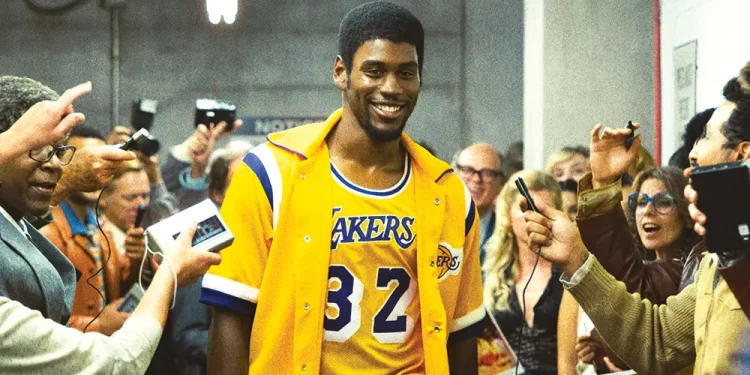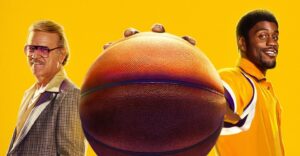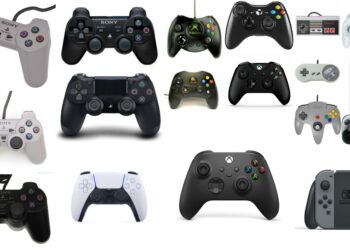By: Brock Vierra
After finishing a fantastic season two of Winning Time: Rise of the Lakers Dynasty, I am back to talk about the bad parts of the series. Now the show is entertaining and riveting and the writers were much more accurate in season two. However, the series shifted from telling the complete story to focusing on just Magic Johnson. Now of course Johnson was the star of the Lakers but the lack of proper storytelling when it comes to the other major characters in the story is almost criminal considering the craziness that went down back in the day. After my first list of bad things about the series, we are back for round two. Let’s talk about it.
- So we’re still not gonna mention Donald Sterling? After his cameo in season one, I was hoping the show would touch on Sterling more in detail this season. The show never mentioned him once during this season. Sterling purchased the Clippers in 1981 and well we all know what would happen 30 years later. However, Sterling’s purchase of the franchise put forth two critical things for the NBA that the show failed to mention, two things that contributed to the success of the Lakers and the league. That is new money entering the league when the NBA was in danger of ceasing operations and the willingness of the NBA to take money from shady characters, something that would impact both the state of the NBA and the Lakers’ success in years to come. Spoiler Alert. We’ll have to see Sterling soon considering the Lakers traded Norm Nixon to the Clippers in 1983.
- The development of Jeanie Buss doesn’t get talked about enough. Now in the show, Buss is portrayed accurately in terms of her relationship with her somewhat misogynistic father. Jerry Buss views Jeanie as a critical member of his operation but in the same breath, refuses to give her control of the Lakers, instead grooming his inadequate sons to eventually take over. Now Jeanie has continued to show growth in her leadership skills, displayed by her management of her father’s tennis team. The biggest thing is that her ambitions came at the detriment of her relationships with others. Highlighted in the series is Jeanie Buss’ work with the tennis team, the Los Angeles Strings. She decided to trade one of her players, a player for which her brother Johnny was dating. Despite Jeanie’s warning to not date her as she was a player, Johnny decided to follow his heart and when the quote on quote “love of his life” got traded, he stormed into Jeanie’s office to yell at her, attacking her biggest insecurity…that she wouldn’t never be Jerry Buss’ son. The show set this scene up horribly by not exploring the sibling relationship outside of their father nor did they give a proper backstory of either why Jeanie traded the player or the relationship between said player and Johnny Buss. It was poorly talked about considering that Johnny and Jeanie have had a strained relationship for about 40 years.
- Everybody took a back seat to the Magic show. Season two emphasized the lifestyle and struggles of Magic Johnson. While the show still highlighted Jerry Buss and put a bigger spotlight on Paul Westhead, they left out Kareem Abdul-Jabbar, Claire Rothman, and Frank Mariani, three critical characters who helped define the success of the Lakers. They also turned Norm Nixon into the bad guy as fodder to Magic Johnson’s injury while Jerry West and Bill Sharman were relegated to background characters. I wanted to see more of West trying to get rid of Westhead, more of Kareem losing command of the team to the newly minted superstar. I wanted to see what we saw from these people in season one but I guess like real life, all the show cared about is the Magic show.
- The show does a poor job of telling the real story of Red Auerbach. Despite his nice voice and teaching prowess shown during his segment “Red on roundball” Red Auerbach was a determined guy, a fierce competitor, and Michael Chiklis does a great job making him look like a prick. His scenes with Jerry Buss amplify the emotion of the Lakers-Celtics rivalry. However, there are key points that the show doesn’t mention that I think are critical in telling the story of the showtime Lakers. Both Jerry Buss and Auerbach had tough upbringings. Auerbach was the son of immigrants and grew up during the great depression. The show doesn’t mention that Bill Sharman played for Auerbach for 10 years or that Auerbach was crucial in integrating the NBA, one of the hallmarks that helped Magic Johnson star in the league. The show makes it seem like Auerbach viewed Bird as this “Great White Hope” while Auerbach in reality was best friends with Bill Russell. He even made Bill Russell his successor but that doesn’t get mentioned. They briefly mention the shady things that Auerbach did to make teams uncomfortable while playing in Boston. What is the major miss for the show is how good he treated his players and how similar his Celtics were to Buss’ Lakers.
- Norm Nixon. Being one of the most important pieces of the pre-Magic Lakers, Nixon’s story doesn’t get told in the light that it should. Nixon has this thread that connects him personally to all the big players in the series. He and Jerry West had a tumultuous relationship during West’s stints as a head coach, assistant GM, and general manager. He was grossly jealous of the drafting of Johnson and the subsequent favoritism shown to him. Due to that, his relationship with Jerry Buss was virtually non-existent. Nixon was named an All-Star in 1982 and then traded in 1983 but the show doesn’t set that up at all. The bigger part is his personal life. While Johnson is getting used to the glamor and fame of Los Angeles, Nixon is a part of it. His wife is Debbie Allen who was briefly mentioned. He acted in a movie with her and Kareem Abdul-Jabbar in 1979. His sister-in-law is Phylicia Rashad who was married to Victor Willis of the Village People during this time and then would marry standout football player Ahmad Rashad. Nixon was the example of LA glamour which is a perfect juxtaposition for Johnson’s newfound fame but all they focus on is his jealousy of Johnson. A justified feeling when you’ve been a crucial member of the organization, won a title with them to save the team from bankruptcy, and are constantly forced to play second fiddle while the star boy of Magic gets preferential treatment while having his own issues.
The show is fantastic and I can not wait for season three. The performances are excellent, the costume and set designs take you back into a different time. Hopefully, the show will continue with the accurate portrayal of season two with the well-roundedness of season one.
For more basketball coverage, check out my episode of The Hot Seat with Melo Williams where we have a candid conversation about the game.


 NFL
NFL






